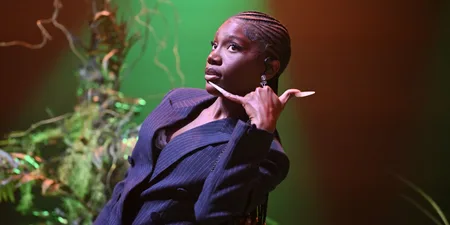As far as British debut albums go, Friendly Fires was pretty damn special
I know it might be hard to fathom right now with the dominance of grime culture and artists such as Stormzy, Skepta, Giggs, Yungen and JME owning the airwaves and taking over every streaming service playlist, but indie used to be Britain’s genre of choice.
Following on from the Brit Pop explosion of the nineties bands such as Bloc Party, The Maccabees, White Lies, Bat For Lashes, The Wombats and many more took what they learned from Oasis and Blur and added a dash of emo here, a sprinkling of synth pop there, and even a splash of electro, folk or garage rock for good measure depending on what took their fancy at the time.
In 2008 a little-known band from St. Albans released their self-titled debut album and moved the indie goalposts even further to the left. Not just extending the perimeters of the genre once again by colouring outside the lines, it helped shape a new and exciting wave of British music.
That band was Friendly Fires.
As a music journalist I often find myself comparing artists or albums to others in order to help give my audience an easily digestible idea of what to expect from whoever or whatever it is I’m writing about. With Friendly Fires it wasn’t that easy.
The music they were making wasn’t like anything else I had heard before – certainly from an indie standpoint at least. Even now, 10 years on, it’s not that easy.
Imagine Nile Rodgers, Toto, Hall & Oates, David Bowie, Duran Duran and Depeche Mode, all donning Hawaiin shirts, getting together on a remote island surrounded by parrots and palm trees, to have a party in an open air art gallery hosted by Jackson Pollock, that’s what I envision when I listen to the band’s debut album. If I had to put it a little more simply I’d probably call it indie disco with art rock tendencies – but even then I’m not sure that really does it justice.
“I think what’s funny about it is that there’s a slight goth element that we didn’t really pursue on the second record,” Jack Savidge, the band’s drummer explains. “So there’s some ‘party party’ bits and then some slightly party goth bits.
“Maybe goth is the wrong word but I mean a sort of darker emotional mood, or at least something like that.”
Throwing out a bunch of other ways to potentially describe the album, Jack seems hesitant when I bring up emo.
“Maybe we have to invoke that word,” he says with a grimace on his face. “But I don’t want to.”
“I think we always wanted it to be a party,” he continues. “Even now we still listen to lots of techno records, house records, disco records and that’s usually how our records end up getting started: getting a groove together and then writing the song on top. The groove is the thing that everything is imprinted into.”
Something that always stood out to me when listening to Friendly Fires was the drums. Whether you listen to the album front to back, back to front, or even on shuffle, the drums stay consistent throughout. They’re always louder than anything else, more prominent, and they’re definitely some of the funkiest percussive arrangements I’ve heard on an “indie” record.
There are times on the album, like on “Lovesick”, where you’d be forgiven for thinking that Questlove, or any other drummer influenced by jazz, swing or Hip Hop, was the man behind the rhythm. Then there are the slightly more aggressive riffs – think “Photobooth’ or “Ex Lover” – that could have so easily been played by someone like Travis Barker or Andy Hurley.
The key to the album’s unique drum patterns and backdrops is in fact to do with how many percussive layers there are on each track.
“Take for example when we were making ‘Jump in the Pool’,” Jack begins. “I think what we did with Paul Epworth, that was a whole lot of drum jamming that he kinda just put on top of each other. I think there was basically three drum parts going on in that song. So that was one technique that was used throughout.
“A lot of the other songs were just done in Ed’s garage with the one mic that Ed owned and a boom stand there, a snare and a Maxamp thing. Some of it was done in the most rudimentary way possible and some of it was done with an established and very prestigious and talented producer, which I suppose kinda followed the narrative of the band at the time.”
One thing I didn’t know until speaking to Jack was that apparently the internet has been getting the lyrics to “Jump in the Pool”, and a few others, wrong for years, and it’s fair to say it’s something he feels very strongly about.
“One really annoying thing about the album and our music in general,” he says with upset obvious in the tone of his voice. “Some of the lyrics on the internet, for say the ‘Jump in the Pool’ chorus, they’re all wrong. The lyrics that have been circulated around the internet are incorrect and it really pisses me off.
“I remember SBTKT covered ‘Blue Cassette’ (from the band’s second album, Pala) for Radio 1’s Live Lounge and I think they got the lyrics off the internet and they were wrong as well, which isn’t their fault at all. I guess perhaps we should have put them on our website so there was never any doubt.”
I ask Jack if he or the band ever thought about going old school and printing the lyrics inside the inlay cover of the physical albums.
“I think I remember us having a meeting with Hannah, our label person at XL, and there was a ‘do you want the lyrics in the CD cover art’ conversation,” he admits. “I think everyone was just like, ‘Nah,’ but if only I knew that decision could have saved us a whole lot of heartache, or me at least, then maybe we’d have made a different decision.”
Going on to influence bands like Spring King, The Magic Gang, Jungle and a whole host of others, they weren’t the only ones to be inspired by Friendly Fires.
“The strangest place our music was used was on Come Dine With Me,” Jack admits, laughing. ‘In the Hospital’ was often used as a bed, especially when they were describing what the menu was for such and such’s dinner party. I always felt like that was quite ironic because it seemed to imply that there was a food poisoning angle to the menu.”
Heralded by critics and playlisted everywhere, one thing that was criminal about the album was the fact it didn’t win the Mercury Prize it was shortlisted for in 2009.
Losing out to Speech Debelle, the self-titled genre-bending masterpiece deserved to take home the winner’s trophy and I think you’ll be hard pushed to find anyone who really knows music – apart from those on the Mercury Prize panel that year – who will say it didn’t deserve to win.
But that’s old news now. It’s in the past. It’s 10 years ago to be exact, even if it doesn’t feel that long ago – to me at least.
“Yeah, I guess it does feel like 10 years ago,” Jack says before rethinking his statement. “They feel like very fresh songs to play live and since we’ve been doing gigs again the reactions have been amazing, so I guess it doesn’t feel like 10 years ago actually.”
“I don’t know,” he says, wondering whether to change his answer again. “As much as any part of your life that passes, it does and it doesn’t because the experiences from that time and the processes we went through to make that music, stuff like that, still feel so fresh. I still remember it very, very vividly but also a whole load of other life stuff has happened since. It’s funny how time compresses important stuff.”
Listen to the self-titled debut album by Friendly Fires below:












































